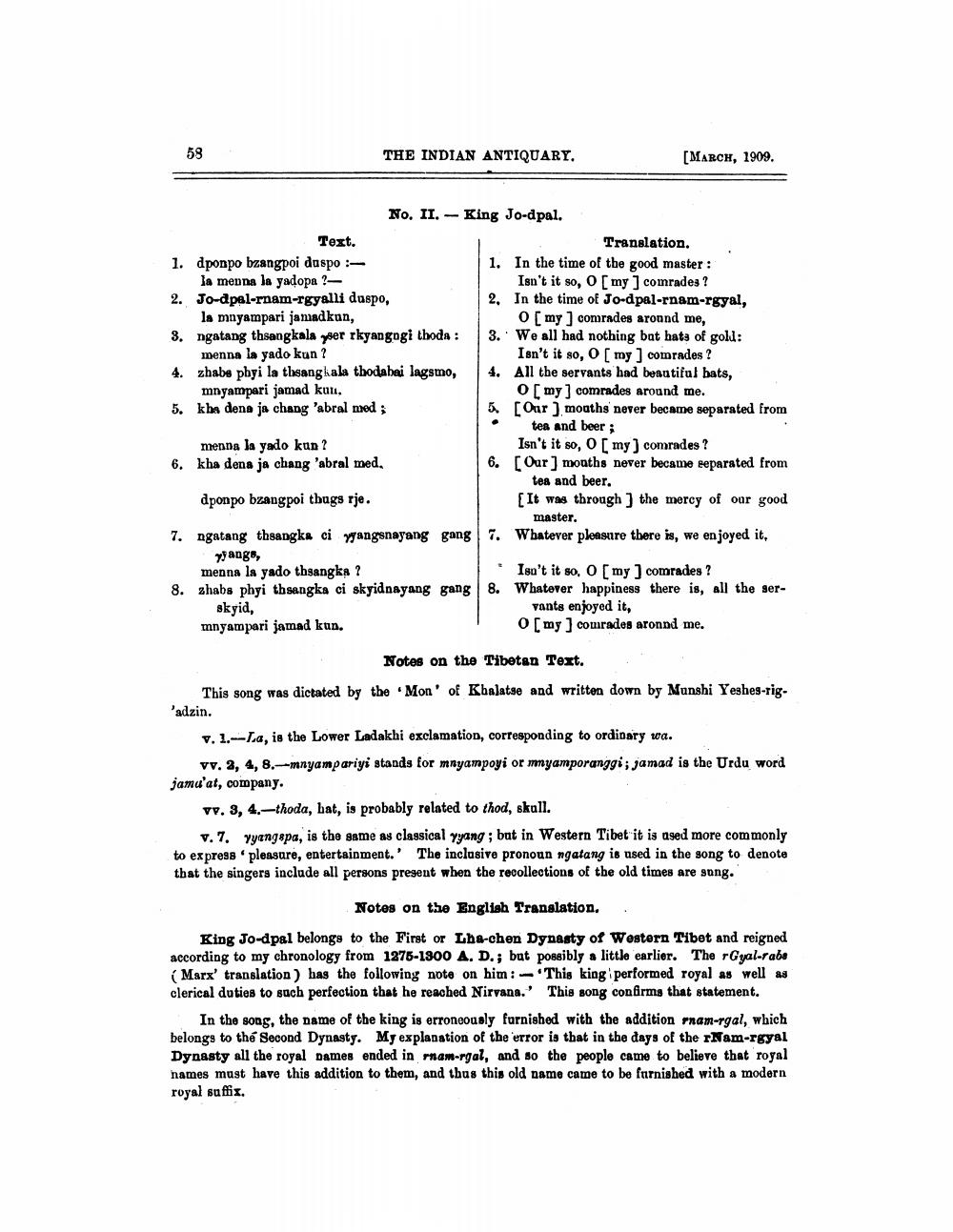________________
58
THE INDIAN ANTIQUARY,
[MARCH, 1909.
No. II. - King Jo-dpal. Text.
Translation. 1. dponpo bzangpoi dospo :
1. In the time of the good master : la menna la yadopa?--
Isn't it so, O (my ] comrades? 2. Jo-dpal-rnam-rgyalli duspo,
2. In the time of Jo-dpal-rnam-rgyal, la mnyampari jamadkan,
0 [my] comrades around me, 8. nentang thsangkala yer rkyangogi thoda: 3. We all had nothing bat hats of gold: menna la yado kun ?
Isn't it so, 0 [my] comrades? 4. zhabs phyi la thsangkala thodabei lagsmo, 4. All the servants had beautiful bats, mnyampari jamad kun,
[my] comrades around me. 5. kha dena ja chang 'abral med;
5. [Oar) mouths never became separated from
tea and beer; menna la yado kun?
Isn't it so, O (my) comrades? 6. kha dena ja chang 'abral med.
6. [Our] months never became separated from
tea and beer, dponpo bzangpoi thugs rje.
[It was through the mercy of our good
master. 7. ngatang thsangka ci wangsnayang gang 7. Whatever pleasure there is, we enjoyed it,
yang, menna la yado thsangka ?
Iso't it so, O [my] comrades? 8. zhabs phyi thsangka ci skyidnayang gang 8. Whatever happiness there is, all the serskyid,
vants enjoyed it, mnyampari jamad kun.
[my] courades aronnd me.
Notes on the Tibetan Text. This song was dictated by the Mon of Khalatse and written down by Munshi Yeshes-rig'adzin.
v.1.--La, is the Lower Ladakhi exclamation, corresponding to ordinary wa.
vv. 2, 4, 8.- mnyampariyi stands for mnyampoyi or myamporanggi; jamad is the Urdu word jamu'at, company.
vv. 3, 4.-thoda, hat, is probably related to thod, skull.
v. 7. yyangepa, is the same as classical Yyang; but in Western Tibet it is used more commonly to express pleasure, entertainment.' The inclusive pronoun ngatang is used in the song to denote that the singers include all persons present when the recollections of the old times are sung.
Notes on the English Translation,
.
King Jo-dpal belongs to the First or Lha-chen Dynasty of Wostorn Tibot and reigned according to my chronology from 1975-1800 A. D. ; bat possibly a little earlier. The rGyal-rabs (Marx' translation) has the following note on him: This king performed royal as well as clerical duties to such perfection that he reached Nirvana.' This song confirms that statement.
In the song, the name of the king is erroneously furnished with the addition rnam-rgal, which belongs to the Second Dynasty. My explanation of the error is that in the days of the Nam-rgyal Dynasty all the royal Dames ended in mam-rgal, and so the people came to believe that togal names must have this addition to them, and thus this old name came to be furnished with a modern royal suffis.




